What is commercial solar?
Commercial solar is solar energy meant for businesses. Solar energy is an excellent clean and renewable energy source and a highly effective energy-saving innovation. As an industry, it falls between the residential and utility-scale solar sectors. This is why commercial solar is often referred to as ‘C&I solar’ or ‘commercial and industrial-scale solar.’ It covers an expansive variety of customers, ranging from governments and large companies to schools, Petrol Pumps or small businesses. You can contact us for installation of Commercial Solar ranges from 20kw to 500kw. Commercial solar plants are like powerful energy factories that connect directly to the grid, ensuring a steady flow of electricity. Made up of solar panels, inverters, and other essential parts, they’re also called on-grid solar systems.
These systems are designed to meet the energy demands of commercial and industrial establishments, such as offices, factories, warehouses, shopping malls, and educational institutions.
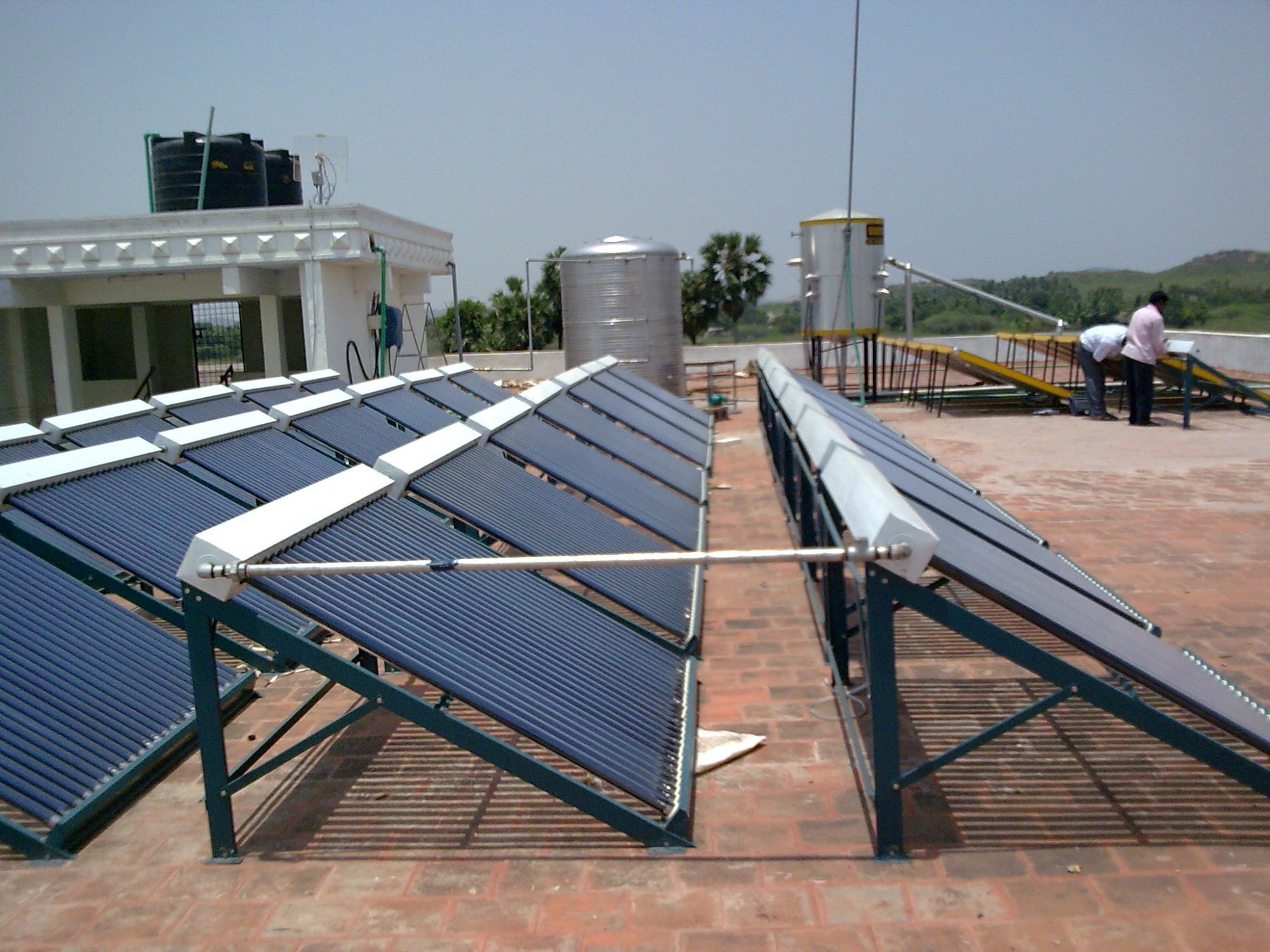
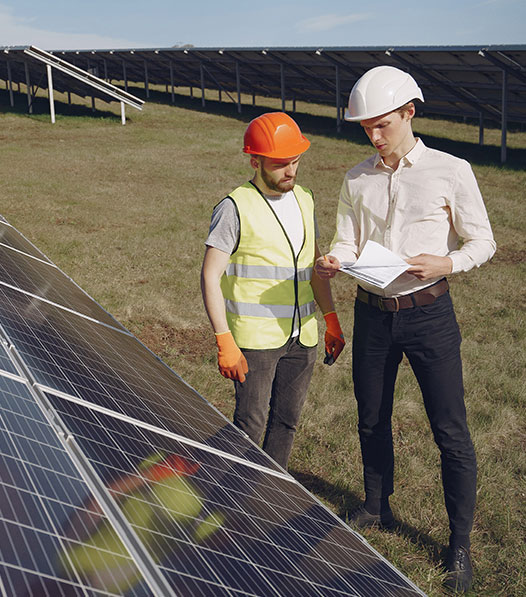
Commercial solar systems follow a systematic process to harness sunlight and convert it into usable electricity. Here’s a breakdown of how this transformation occurs:
1.Sunlight Activation of Solar Panels:Typically made from layers of silicon cells, a glass casing with a special film, a metal frame, and wiring, are activated by sunlight. These panels are strategically installed in ordered series on large outdoor spaces or rooftops to maximize sunlight absorption.
2. Electricity Generation by Solar Cells:Also known as photovoltaic cells, they absorb sunlight during the day. These cells consist of semiconductor wafers with positively and negatively charged layers. When sunlight hits the cells, it generates an electric field, causing electrons to move and creating an electrical current.
3. Conversion to Usable Electricity:The generated electricity is in the form of direct current (DC), which is then converted into alternating current (AC) using an inverter. This conversion makes the electricity usable for powering lights, machinery, and other electrical devices within the commercial property.
4. Utilizing Converted Electricity:The converted AC electricity is distributed throughout the property to power various equipment and systems. This electricity works seamlessly alongside electricity from the local utility company, ensuring continuous power supply even during periods of solar shortage.
5. Net Metering and Benefits:Excess electricity produced by the solar panels can be sent back to the utility company’s grid through net metering. This surplus energy is credited to the property owner, providing benefits such as reduced electricity bills and environmental impact. Installing a smart electric meter enables property owners to track energy flow and take advantage of net metering benefits, ensuring efficient utilization of solar energy resources.
Benefits of Commercial Solar Plant
Commercial solar plants offer numerous benefits that extend across economic, environmental, and social dimensions. One of the primary advantages is cost savings. By harnessing solar energy, businesses can significantly reduce their dependence on traditional energy sources. This leads to lower electricity bills and provides a hedge against volatile energy prices, stabilizing operational costs in the long term.
Cost Savings
Commercial solar power plants offer businesses significant cost savings on electricity bills by generating their electricity onsite, reducing reliance on expensive grid power and hedging against rising electricity prices.

Environmental Sustainability
By transitioning to solar energy, businesses can reduce their carbon footprint and mitigate climate change impacts, contributing to India’s environmental sustainability goals and promoting a cleaner, greener future

Energy Security and Reliability
Solar energy provides a reliable and uninterrupted source of power, enhancing energy security and reliability for businesses, particularly in regions prone to grid outages and power shortages.
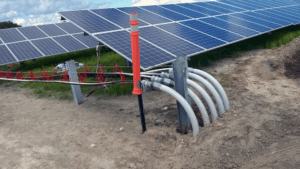
Brand Reputation and CSR
Embracing solar energy demonstrates a company’s commitment to sustainability, enhancing brand reputation and corporate social responsibility efforts. This can attract environmentally conscious consumers and differentiate the business in the marketplace.
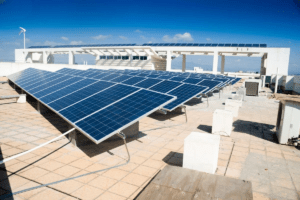
Businesses can benefit from various government incentives and subsidies available in India, including subsidies, tax incentives, and favorable regulatory frameworks. These incentives help offset the initial investment and improve the financial viability of solar energy adoption.
Government Incentives
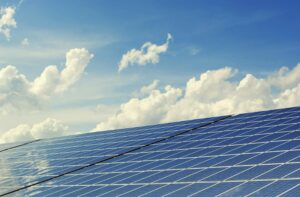
Long-Term Financial Viability
Despite the initial investment, commercial solar power plants offer long-term financial benefits, including reduced electricity bills, potential revenue from excess energy generation through net metering, and enhanced operational efficiency.
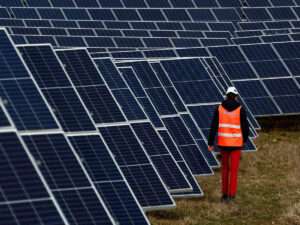
Compliance with Renewable Energy Targets
Investing in solar energy helps businesses comply with India’s renewable energy targets and regulatory requirements, positioning them as leaders in the sustainable energy transition and contributing to national energy security goals.
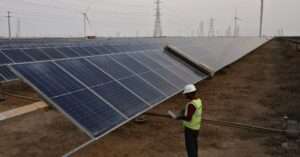
Maintaining a solar PV system doesn’t require much effort due to its lack of moving parts. However, regular upkeep is essential to ensure optimal performance over the years. We suggest hiring a professional solar panel cleaner at least twice annually to keep your panels free of debris and eliminate any fire hazards. Your solar installer will also suggest how often to service your system, following the warranty needs of your inverter. Using the monitoring tools in your system helps spot any changes in efficiency or output, telling you when it’s time for maintenance or servicing.
Maintenance of Your Commercial Solar System
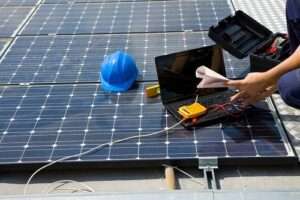
Can an industrial solar power system generate enough energy to power a business in Mohali, Punjab?
Yes, an industrial solar power system can generate enough energy to power a business in India, depending on the size of the system and the energy needs of the business. Many businesses have successfully switched to solar power and have been able to generate enough energy to meet their needs while reducing their energy costs and carbon footprint.
What is the lifespan of a commercial solar power system in Chandigarh?
Commercial solar power systems are designed to last for decades, with many components having warranties of 30 years or more. However, the lifespan of commercial solar systems can vary depending on factors such as the quality of the components used, the maintenance of the system, and the weather conditions in the area.
How long does it take to install commercial solar systems in Chandigarh?
The time it takes to install commercial solar power systems in India can vary depending on the size and complexity of the system. However, in general, the installation process can take anywhere from a few weeks to a few months, depending on factors such as the availability of equipment, local permits, and the complexity of the installation.
What are the commercial solar system benefits for businesses?
Commercial solar power systems offer many benefits to businesses in India, including reduced energy costs, increased energy independence, a lower carbon footprint, and the potential for tax incentive and savings. Additionally, solar power systems are scalable, easy to maintain, and can increase a business’s reputation as a socially responsible and sustainable organisation.
How can a business choose the right industrial solar power system for its needs?
Choosing the right industrial solar power system involves several factors, including the size of the business, the energy needs of the business, the location of the business, and the available budget. A qualified solar power installer can work with the business to assess its needs and recommend the right system for its specific requirements.
What sizes of commercial solar panel systems does Eco Solar System Chandigarh offer?
Eco Solar System Chandigarh offers commercial solar panel systems ranging from 100 kW to 500 kW, as well as larger systems from 1 MW to 5 MW.
How long does it take to install commercial solar panels?
The installation of commercial solar power panels typically takes a few weeks, depending on the project’s size and complexity.
